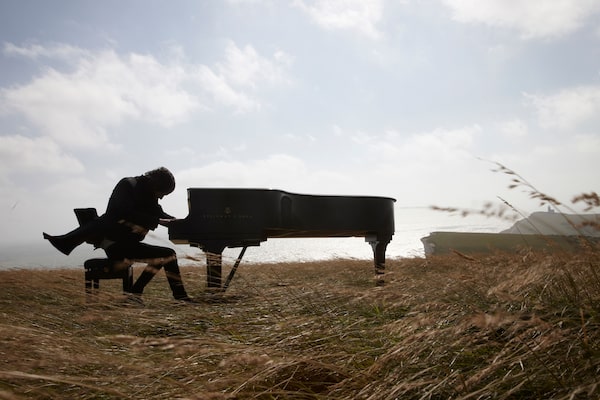
British concert pianist James Rhodes makes his Canadian debut at Koerner Hall in Toronto on March 5.Jose Guttierez/Handout
James Rhodes is on a mission to popularize classical music and to champion its master composers. He challenges the genre’s ruling class and believes white powder should be saved for doughnuts, not wigs. The rock-star British concert pianist thinks his latest book (Playlist: The Rebels and Revolutionaries of Sound) should be required reading for grade-schoolers. And, get this, the Ludwig-loving iconoclast wants to share an arena crowd with Bryan Adams.
“I’d love for someone like Bryan to invite me to open a concert,” says Rhodes, speaking from his home in Madrid. "I would play 20 minutes of Beethoven and Chopin. It would be loud, it would be amplified, it would be fantastic. And there would be a few people out of the 20,000 crowd who will think, ‘I had no idea that this is what classical music would be.' ”
Roll over Chuck Berry, then, and tell Adams the news.

British rock-star concert pianist James Rhodes, who makes his Canadian debut on March 5 at Koerner hall. Album cover for "The Beethoven Revolution".Handout
On March 5, Rhodes makes his Canadian concert debut at Toronto’s Koerner Hall with an all-Beethoven program. He’ll keeps things loose – “I wear jeans on stage because they’re comfortable” – but he’ll play full out, kicking out the sonatas like there’s no tomorrow. Perhaps because there was a time when his tomorrow was in jeopardy.
If one wishes to be introduced to classical music and seven of its iconic composers – stand up, Bach, Mozart, Schubert, Rachmaninoff, Ravel, Chopin and Beethoven – the lavishly illustrated Playlist is the book for the job. If one is interested in Rhodes himself, however, his 2015 book Instrumental: A Memoir of Madness, Medication and Music would be the place to start.
The candid memoirs tell a horrifying tale about sexual abuse as a child at the hands of a prep-school phys-ed teacher. Until the age of 14, Rhodes had no formal music education, and at 18, he stopped playing the piano entirely for a decade. In his early 30s, a traumatized Rhodes attempted to kill himself in a psychiatric hospital.
“I was a weird kid,” the 40-year-old maestro and media personality says. “Monstrous things happened to me – things that kids should not have to deal with. And sadly, it’s all too common."
Because his alleged assailant died before he could appear in court, Rhodes’s savior was not the British judicial system. Music was. “In the midst of all this madness, it was literally the only thing that was for just for me," he explains. "It couldn’t be stolen or manipulated or cheated from me.”
(Just this month, the government of Spain announced a law to protect children from violence. The new legislation will be known as the Rhodes law, in recognition of campaigning by the pianist in defence of children’s rights.)
It was the playing of the genius Canadian pianist Glenn Gould that had the most profound effect on Rhodes. “When I discovered Gould, it was like a key unlocking something, and it fit perfectly.”
Gould, like Rhodes, was a maverick. He was a slouchy figure on the piano bench, legs crossed, humming or whistling to himself occasionally. He was a Bach enthusiast, given to unorthodox musical interpretations and personal eccentricity. And, of course, he was a miraculous key striker. “The way he played should have been illegal,” Rhodes says, in full fanboy mode. “There was nothing he could not do.”
In short, classical music rescued Rhodes. What Rhodes is doing now is returning the favour.
Over the past five years, according to the U.S. National Endowment for the Arts, attendance at classical music performances has decreased to the point that only 8.8 per cent of Americans are attending classical concerts. Orchestras are being discontinued. Audiences are dying off. Millennials are turning a deaf ear to Beethoven; violin bows rub them the wrong way.
According to Rhodes, whose TV documentary Don’t Stop the Music raised money for instruments for British elementary schools, it’s not the youngins’ fault. “Unless you’ve got money, the chances of someone knowing what a live cello sounds like is next to zero, let alone the opportunity to play it. I feel we have an obligation to try to do what we can to make classical music as accessible as possible, without dumbing it down."
It is Rhodes’s notion to eliminate the stuffy ritual of live classical music. On stage, he is chatty and informal. His hair is tousled. Given his unshaven appearance, he clearly has no endorsement deal with Gillette. His brash approach to classical presentation earned him a six-album deal not with Deutsche Grammophon, but with Warner Records, home to Madonna, Black Sabbath and Ed Sheeran.
In the name of devil’s advocatism, I put it to Rhodes that classical music aficionados want the grandeur, formality and decorum normally associated with live classical music. A video of a blind elephant in Thailand being soothed by works of classical-music masters made the social-media rounds a couple of years ago. The elephant wasn’t dumb: It’s a jungle out there. People (like pachyderms) want a civilized respite from the crazy. They want tradition. They want to party like it’s 1799.
“Do they?” Rhodes asks. “They want typhus and people coughing and freezing in the cold?”
(In fairness, that sounds more like a Ramones show at Rockaway Beach in 1977 than any Beethoven event back in the day.)

Rhodes's brash presentation offers a sharp contrast to the common perception of classical music.Richard Ansett/Handout
“Listen,” Rhodes continues, “as far as the grandeur, the sanctity and the pageantry, the music does all that. I will always fight to play big, long complicated pieces of music. But the presentation needs to be different. We don’t require the ritual of a virtuoso pianist strutting on to the stage, scowling at the audience, not saying a word, playing and then going home.
“If Beethoven or Chopin went to a concert today, they’d fall down laughing.”
Mervon Mehta, performing arts executive director at the Royal Conservatory of Music, sees Rhodes’s side of the argument. “Yes, an audience has a certain expectation,” he says, “but I’m all for getting away from the rules.”
The rules Rhodes and Mehta are talking about are things such as not clapping between movements of symphonies. “That’s a very 20th-century construct that never happened in Mozart’s time,” Mehta says. “Somehow we’ve become this dress-up elitist thing. We try to fight against that every day.”
In the opera world, one of the most dedicated barrier breakers is Against the Grain Theatre, a Toronto-based opera collective that presents classical music in unusual venues. On its monthly Opera Pub nights, five-dollar beers and a pint-sized La Bohème are on tap.
Asked about opera in a lager-based environment, the opera composer and Juno-winning pop musician Rufus Wainwright says he is wary of the simplification of the art form. “I think it’s important to maintain some of opera’s pageantry.”
That being said, Wainwright isn’t advocating a return to a snuff-and-wig era. “Opera was never meant to be rarefied,” he says. “It was the jukebox of its time, and the tenors were superstars. But at a certain point, it lost its connection to the people. It became more of an ivory tower.”
Rhodes is dedicated with taking down that tower, with the help of people such as his friend and fellow pianist, Chilly Gonzales. The Germany-based former Montrealer developed a workbook, Re-Introduction Etudes, aimed at demystifying the piano and bringing lapsed pianists back to the instrument. An audacious performer, he once forced Rhodes to play a piece from Gluck’s Orfeo ed Euridice a different way by coating the piano keys with syrup.
“I love Chilly,” Rhodes says. “Anyone who can wear a dressing gown on stage and can play the way he plays has to be applauded.”
Rhodes envisions a day when he and Gonzales could fill an arena with an Elton John/Billy Joel kind of double bill. “There’s no reason in the world why that shouldn’t happen,” he says. “We need to stop apologizing for classical music and stop trying to keep it for ourselves. You don’t need to sell it. The music does that by itself.”
An Evening in Conversation with James Rhodes happens March 4 at Isabel Bader Theatre; the Glenn Gould Foundation presents James Rhodes March 5 at Toronto’s Koerner Hall.
Find out what’s new on Canadian stages from Globe theatre critic J. Kelly Nestruck in the weekly Nestruck on Theatre newsletter. Sign up today.
 Brad Wheeler
Brad Wheeler